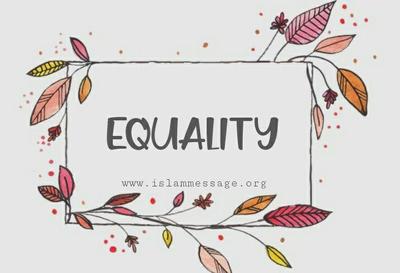
muhammad (pbuh) asked people to shun notions of racial, family or any other form of superiority based on mundane things and said that righteousness alone was the criterion of one's superiority over another. it has already been shown how he mixed with everyone on equal terms, how he ate with slaves, servants and the poorest on the same sheet (a practice that is still followed in arabia), how he refused all privileges and worked like any ordinary laborer. two instances may, however, be quoted here:
once the prophet (pbuh) visited saad bin abadah. while returning saad sent his son quais with him. the prophet (pbuh) asked quais to mount his camel with him. quais hesitated out of respect but the prophet (pbuh) insisted: "either mount the camel or go back." quais decided to go back. (abu dawud, kitabul adab)
on another occasion he was traveling on his camel over hilly terrain with a disciple, uqba bin aamir. after going some distance, he asked uqba to ride the camel, but uqba thought this would be showing disrespect to the prophet (pbuh). but the prophet (pbuh) insisted and he had to comply. the prophet (pbuh) himself walked on foot as he did not want to put too much load on the animal. (nasai pg. 803)
the prisioners of war of badr included abbas, the uncle of the prophet (pbuh). some people were prepared to forgo their shares and remit the prophet's (pbuh) ransom but he declined saying that he could make no distinctions. (bukhari, sahih bukhari, chapter "ransoms")
during a halt on a journey, the companions apportioned work among themselves for preparing food. the prophet (pbuh) took upon himself the task of collecting firewood. his companions pleaded that they would do it and that he need not take the trouble, but he replied,
"it is true, but i do not like to attribute any distinction to myself. allah does not like the man who considers himself superior to his companions." (zarqani, vol 4 pg. 306)


